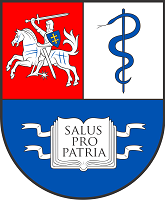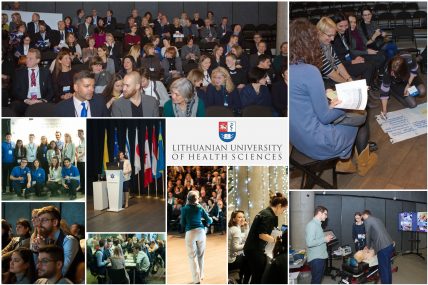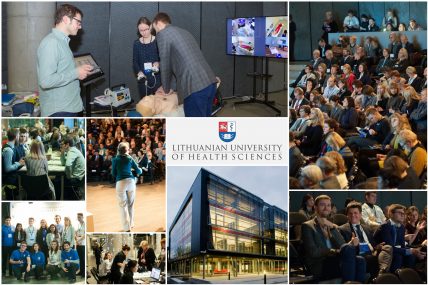
International Conference Diplomats for Life 4.0
Evolution in medical training

International Conference Diplomats for Life 4.0
Evolution in medical training
Eivenių Str. 4, LT-50161, Kaunas, Lithuania
We live in the constantly changing world. Emerging trends, such as an aging and growing population, exponential growth in medical discovery, high public and patient expectations, and increasing reliance on technology, are demanding rapid and simultaneous changes in medical education and health care delivery. We have to adapt to this evolving environment, when we work, teach or study. Every day we have to deal with new people (students, patients and their relatives), new attitudes and changes of interpersonal communication. We have to face the changes in the patient-doctor relationship. And at this time we came to realize that the advances in Medicine and Medical education depend not only on the progress in science and technology or innovations, but more importantly on our own ability to learn, improve, change and adapt.
We all also strive to build a health care system that provides the highest quality, most affordable, patient-centered care every time and enhances the overall health of the patients it serves. Achieving these goals requires physicians who are well equipped to focus on issues such as systems thinking, population health, health equity, continuous improvement, and inter professional collaboration. Therefore, we cordially invite all the physicians, nurses, medical educators, lecturers, coordinators, residents and students, who are interested in medical education and who want to enhance their own life-long learning abilities, and versatility, to take part in the upcoming conference. International team of experts will share their experience during the interactive lectures and hands-on workshops.
The conference will be held in the Education and Laboratory Center (Eiveniu str. 4, Kaunas) of the Lithuanian University of Health Sciences on November 29th, 2019 in Kaunas, Lithuania.
The health systems of many countries are mostly unique, being influenced by historic, cultural and economicpeculiarities, therefore they change slowly trying to integrate economic and global challenges. Lately, health caresystems have been aligning their developments, however inequalities between health care services within national andregional centres, between competencies of their specialists and especially generations of specialists remain to exist.
Medical education is a system for theoretical and practical training of health care specialists. One of the most important training periods of physicians is residency training. After residency training the specialists are supposed tobecome perfectly skilled members of the health care system, providing best quality services. Until now, differentmodels for training the physicians exist – British, American, Canadian, Scandinavian, French, etc. The biggest differenceswithin these models exist in postgraduate education, while undergraduate training is more or less aligned. While in theEU there are minimal requirements for training the physicians, however educational process might be quite differentbetween countries and even within countries different universities.
The expectations by patients are always the priority despite economic situation and health human resources ofthe country. All countries have their own important and unique achievements in medical education, looking for new andmore effective training methods within their economic and cultural conditions. Sharing these experiences enricheseveryone and builds up more value for the patient – more effective and safe services.
In 2013 all residency programs at the Lithuanian University of Health Sciences (LUHS) were renewed groundedon study targets and competencies methodologies. In 2015, in order to monitor and ensure quality of the renewedresidency programs, the system developed by researchers of Radboudumc University Medical Centre, theNetherlands, called EFFECT (evaluation and feedback for effective clinical teaching) was tested and validated for use atLUHS. The visits, trainings and support in this whole process by the colleagues from the Netherlands, resulted in a newstep within medical education in Lithuania. The EFFECT system has been established in more than 20 hospitals in theNetherlands (6 – university hospitals), showing continuously improving quality in clinical training of residents. Currently,the Netherlandish researchers are sharing their experience at Linkoping University Hospital, Sweden.
LUHS is also expanding cooperation with other leading countries in medical education in the world – Canada,Israel, Scotland. Aiming at more effective progress of medical education in Lithuania, we are seeking to invite ourcolleagues interested in the field, to foresee our common goals for a longer timelines, to find support from funds andindustry building human and financial resources.
Aiming at commemoration of the work and dedication of the honorary consul of the Netherlands in Kaunas Jan Zwartendijk and to emphasize his historic cooperation with HE consul of Japan in Kaunas Chiune Sugihara saving thelives, using the experience of the movement „Diplomats for life “, using the cooperation and alumni relating amongUniversities, we have an intention to join efforts and experience of the Lithuanian, Canadian, Dutch, Israeli and Swedishspecialists in medical education, physicians, politicians, diplomats and businessmen. This is why we are starting theconferences, seminars, site visits, joint projects and publications of medical education research, and we are constantlyexpanding this international cooperation.
It was no coincidence that the idea to hold this conference linking it to the historic context emerged. Thinking about the education of future practitioners and international relations of the university, the organisers of the conference decided to remind that two diplomats, i.e. Japanese Consul Chiune Sugihara and Dutch Honorary Consul Jan Zwartendijk had undertaken a noble mission saving lives. In partnership with each other these two diplomats carried out a true act of bravery.
The Sugihara House has settled in the building where Japanese Vice-Consul Chiune Sugihara (1901 – 1986) worked before World War II (1939 – 1940). In July to August 1940, the said diplomat issued Japanese transit visas to Jewish nationals from Lithuania, Poland and Germany that saved almost 6,000 innocent people from death.
At present, this historic building in Kaunas at Vaižganto St 30 houses a museum; conferences, educational projects involving schools and universities are held here. It is also home to the Sugihara Foundation “Diplomats for Life”, whose promoters are seeking to combine intellectual efforts in order to keep the memory of not only the above two diplomats alive in Lithuania, but also promote opening of the most sore historic pages of Lithuania to a wider public and tell the world about what cooperation for the sake of life can do as well as what tolerance and ability to comprehend another one or a different one mean to a person of nowadays.
The model of Mr C. Sugihara and Mr J. Zwartendijk remind the present generation of the threats hidden in the nature of the humankind and illustrate the examples of tolerance, kindness and justice. Therefore, when organising an international scientific-practical conference seeking to draw attention to timeless values, the Lithuanian University of Health Sciences in partnership with the Ministry of Health of the Republic of Lithuania, which has shown an immense focus on the said event, Vilnius University and the Association of Young Practitioners have opted for the name “Diplomats for Life: Medical Education and Clinical Practices”. This event is under the aegis of Kaunas City Municipality. Mayor Visvaldas Matijošaitis supports this new initiative.
The conference plans to merge the forces of Canadian, Lithuanian, Dutch, Swedish, Japanese and Israeli experts in medical education as well as practitioners, politicians, diplomats and business representatives by making use of the experience gained by the “Diplomats for Life” movement and their historic neighborhood and alumni ties with universities. Not only does the LUHS already hold extensive experience in terms of international cooperation; but it also shares its experience within the entire region of Kaunas and across Lithuania. The idea of this conference is supported by the Rector of the LUHS as being original and new.
The goal of the conference is to strengthen medical education in Lithuania on the basis of not only professional experience, but also closer cooperation and sharing of noble ideas.



